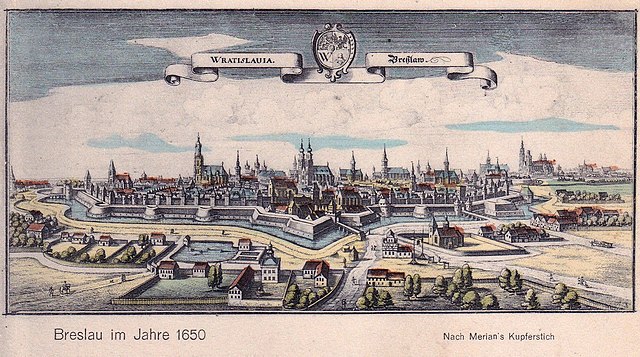Wrocław
city in the Lower Silesian Voivodeship, southwestern Poland, and historical capital of Silesia From Wikipedia, the free encyclopedia
city in the Lower Silesian Voivodeship, southwestern Poland, and historical capital of Silesia From Wikipedia, the free encyclopedia
Wrocław (Polish: [ˈvrɔt͡swaf] (![]() listen);[lower-alpha 1] German: Breslau,[lower-alpha 2] pronounced [ˈbʁɛslaʊ̯] (
listen);[lower-alpha 1] German: Breslau,[lower-alpha 2] pronounced [ˈbʁɛslaʊ̯] (![]() listen); Lower Silesian: Brassel)[4] is the biggest city in Lower Silesian Voivodeship in the southwest part of Poland. The German name of the city is Breslau, and the Czech name is Vratislav. The Oder River goes through the city. There are also 4 other small rivers which connect with the Oder River in the territory of the city: Bystrzyca, Oława, Ślęza and Widawa. Before World War II there were 303 bridges in the city; now there are about 220. In Latin it is called "Vratislavia".
listen); Lower Silesian: Brassel)[4] is the biggest city in Lower Silesian Voivodeship in the southwest part of Poland. The German name of the city is Breslau, and the Czech name is Vratislav. The Oder River goes through the city. There are also 4 other small rivers which connect with the Oder River in the territory of the city: Bystrzyca, Oława, Ślęza and Widawa. Before World War II there were 303 bridges in the city; now there are about 220. In Latin it is called "Vratislavia".
Wrocław | |
|---|---|
| |
| Motto: | |
| Coordinates: 51°06′36″N 17°01′57″E | |
| Country | |
| Voivodeship | |
| County | city county |
| Established | 10th century |
| City rights | 1214 |
| Government | |
| • City mayor | Jacek Sutryk |
| Area | |
| • City | 292.92 km2 (113.10 sq mi) |
| Highest elevation | 155 m (509 ft) |
| Lowest elevation | 105 m (344 ft) |
| Population (31 December 2021) | |
| • City | 672,929 (4th)[1] |
| • Density | 2,190/km2 (5,700/sq mi) |
| • Metro | 1,250,000 |
| • Demonym | Vratislavian |
| Time zone | UTC+1 (CET) |
| • Summer (DST) | UTC+2 (CEST) |
| Postal code | 50-041 to 54–612 |
| Area code | +48 71 |
| Car plates | DW, DX |
| Website | www |

Wrocław is over 1000 years old. It was originally a Slavic town. During the Middle Ages it became a German city, but before that Wrocław was a Czech city. It was called Breslau for a long time. During the Second World War the city was badly damaged. About 70% of the buildings were damaged. Many of them were rebuilt. After the war, the city became Polish, and the German citizens were forced to leave. It has been called by its Polish name Wrocław ever since.
Johannes Brahms wrote his Academic Festival Overture to thank the University of Breslau in Wrocław. This was for an honorary doctorate he was awarded by the university.[5]
Its population in 2004 was 638,000. There are 10 universities in the city. It is famous for its beautiful historical town square (Polish rynek) and cathedral (large church).
In 1997 the Oder River flooded, causing a lot of damage.
10 people from Wrocław have won the Nobel Prize. They are:
Seamless Wikipedia browsing. On steroids.
Every time you click a link to Wikipedia, Wiktionary or Wikiquote in your browser's search results, it will show the modern Wikiwand interface.
Wikiwand extension is a five stars, simple, with minimum permission required to keep your browsing private, safe and transparent.